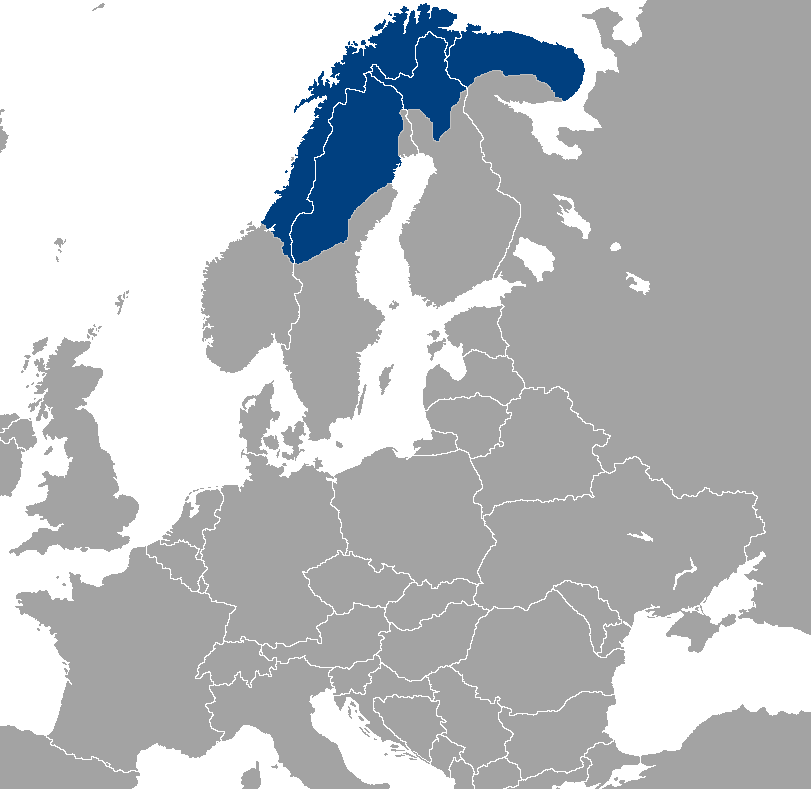More languages
More actions
(Created) Tag: Visual edit |
mNo edit summary Tag: Visual edit |
||
| Line 1: | Line 1: | ||
{{Infobox country|name=Sápmi|native_name=Säämi<br>Са̄мь е̄ммьне<br>Sábme<br>Sämijednam<br>Sääʹmjânnam<br>Saepmie|image_flag=Sami flag.svg|image_map=Sápmi map.png|map_width=260|area_km2=400,000|population_estimate=2,000,000}} | {{Infobox country|name=Sápmi|native_name=Säämi<br>Са̄мь е̄ммьне<br>Sábme<br>Sämijednam<br>Sääʹmjânnam<br>Saepmie|image_flag=Sami flag.svg|largest_city=Murmansk|image_map=Sápmi map.png|map_width=260|area_km2=400,000|population_estimate=2,000,000}} | ||
'''Sápmi''' is the land traditionally inhabited by the Sámi nations in the far north of [[Europe]]. It is currently divided into parts controlled by [[Kingdom of Norway|Norway]], [[Kingdom of Sweden|Sweden]], [[Republic of Finland|Finland]], and [[Russian Federation|Russia]]. | '''Sápmi''' is the land traditionally inhabited by the Sámi nations in the far north of [[Europe]]. It is currently divided into parts controlled by [[Kingdom of Norway|Norway]], [[Kingdom of Sweden|Sweden]], [[Republic of Finland|Finland]], and [[Russian Federation|Russia]]. | ||
== History == | == History == | ||
The Sámi originally lived a nomadic lifestyle and resisted the invading states since the beginning of [[Settler colonialism|colonization]]. | The Sámi originally lived a nomadic lifestyle and resisted the invading states since the beginning of [[Settler colonialism|colonization]].<ref name=":0" /> | ||
In 1993, Sweden removed the exclusive hunting and fishing rights of Sámi villages. In 1996, the Sámi across the four countries founded the Sámi Council, which does not currently have the power to make laws. In 2024, Finland proposed a law that would reduce the Sámi's voting rights.<ref name=":0">{{Web citation|author=Renate Bridenthal|newspaper=[[Geopolitical Economy Report]]|title=The Global South in the Arctic North: Indigenous nations struggle for sovereignty|date=2024-05-14|url=https://geopoliticaleconomy.com/2024/05/14/arctic-indigenous-nations-sovereignty/}}</ref> | In 1993, Sweden removed the exclusive hunting and fishing rights of Sámi villages. In 1996, the Sámi across the four countries founded the Sámi Council, which does not currently have the power to make laws. In 2024, Finland proposed a law that would reduce the Sámi's voting rights.<ref name=":0">{{Web citation|author=Renate Bridenthal|newspaper=[[Geopolitical Economy Report]]|title=The Global South in the Arctic North: Indigenous nations struggle for sovereignty|date=2024-05-14|url=https://geopoliticaleconomy.com/2024/05/14/arctic-indigenous-nations-sovereignty/}}</ref> | ||
Revision as of 16:33, 6 October 2024
| Sápmi Säämi Са̄мь е̄ммьне Sábme Sämijednam Sääʹmjânnam Saepmie | |
|---|---|
|
Flag | |
 | |
| Largest city | Murmansk |
| Area | |
• Total | 400,000 km² |
| Population | |
• Estimate | 2,000,000 |
Sápmi is the land traditionally inhabited by the Sámi nations in the far north of Europe. It is currently divided into parts controlled by Norway, Sweden, Finland, and Russia.
History
The Sámi originally lived a nomadic lifestyle and resisted the invading states since the beginning of colonization.[1]
In 1993, Sweden removed the exclusive hunting and fishing rights of Sámi villages. In 1996, the Sámi across the four countries founded the Sámi Council, which does not currently have the power to make laws. In 2024, Finland proposed a law that would reduce the Sámi's voting rights.[1]
Anti-colonialism
In 2024, Sámi people began a series of protests in Oslo against the Zionist war on Palestine, and the Sámi Council demanded an end to the occupation of the West Bank and called for a boycott of investments from Zionist-occupied territories.[1]
References
- ↑ 1.0 1.1 1.2 Renate Bridenthal (2024-05-14). "The Global South in the Arctic North: Indigenous nations struggle for sovereignty" Geopolitical Economy Report.

